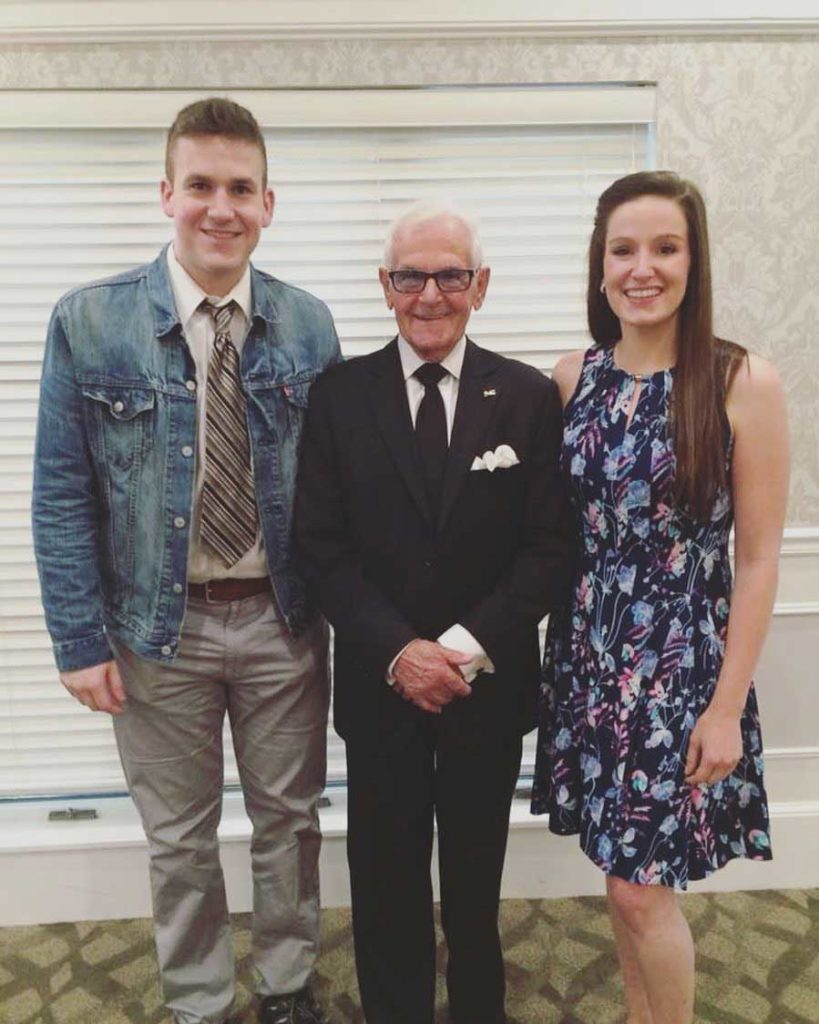Holocaust survivor Max Slabotzky made fraudulent claims about surviving some of most infamous camps. He fooled many, including young writers Autumn Minery and Bryer Sousa who were endeavoring to write his memoirs. Here is their account of what happened.
The Rare Unfortunate Realities of Life as a Writer
by: Autumn Minery and Bryer Sousa
“I have always tended to avoid Holocaust literature… and find some of the recent fictional accounts masquerading as true stories profoundly disturbing… it is tantamount to desecrating war graves. We ought to at least show [the dead] enough respect to refrain from making up false stories about how their lives ended…” – Professor Weinberg
“Survivors of the Nazi death camps deserve unlimited sympathy for having had to endure the worst evils of humanity. Therefore, it is socially risky and no doubt unpopular to question the testimony of someone claiming to be a survivor. However, there are countless accounts of people who have faked such claims… I believe in truth…” – Andrew Reid
College Students Begin Max Slabotzky’s Memoir
Graduating from college is both exciting and terrifying. One has gained a degree of knowledge, (hopefully) freedom, and potentially some newfound confidence in what you have spent the last four years studying. Some graduates leave with jobs lined up and ready to take on the world and feeling secure. Yet others are left wondering where the next year will take them, feeling scared and a little under qualified — even in something, deep down, they know they are qualified for. It becomes increasingly difficult for students to find jobs in their fields, especially in today’s economy. And this is why being given a chance to write Holocaust survivor Max Slabotzky’s memoir seemed like a gift from the writing gods.
For those readers of the West End News that do not know, last year around this time, the two of us wrote a two-piece article on Holocaust survivor Max Slabotzky of Portland. Mr. Slabotzky and the extreme circumstances of his life — not to mention his passion for educating others about the extreme conditions of WWII from the view of a Jewish victim — was nothing but honorable and inspiring. When we took on the project our goal was nothing but to give Slabotzky’s story a more permanent form, that of a narrative from his perspective.
Since then, things have changed drastically.
Work on the Memoir is Halted
It seemed as though we had it all figured out. We had just outlined the entirety of our book proposal after reaching out to some fantastic mentors and other professionals. We were beginning to piece together our research, personal interviews and knowledge of creative non-fiction together. Each of us had already begun the chapters we had assigned ourselves to write. The writing process (which we knew would be a difficult yet rewarding task) was beginning to happen. We both felt at once accomplished and humbled by the task at hand, and more importantly, excited.
These progressions came to a halt one summer afternoon in July after a phone call from the Holocaust and Human Rights Center of Maine.
There were moments where this project seemed both daunting and impossible. And so finding out that Mr. Slabotzky had put on a show for his audiences over many years past seemed like a reason to let out a sigh of relief. But more drastic were our feelings of anger, disappointment, betrayal and utter embarrassment for having fallen for something so wrong and hideous.
In brief, we have attempted to tend to the evidence provided to us, which contrasts the narrative Max Slabotzky evoked to his own benefit (each and every time he was paid to speak at a Maine-citizen funded university or middle/high school). We proceeded in a manner comparable to that of a defense attorney. That is, we presumed his innocence, until we amassed the necessary historical records and expert testimony to convince us, beyond a reasonable doubt, that Mr. Slabotzky exploited the suffering of millions of Jews and political enemies for reasons that we cannot bare to speculate about.
The Evidence Against
While an examination of our findings will be posted on www.bryersousa.info in the near future, please note that the Holocaust and Human Rights Center of Maine has removed Slabotzky from their Speakers Bureau. Also, a Technical Information Specialist of the United States Holocaust Memorial Museum has assessed the situation, concluding that “There is also an additional handstamp nearby stating that ‘No restitution authority has previously inquired..’ which would frankly have been almost unheard of for a survivor of both Dachau and Auschwitz Concentration Camps.” The infamous Claims Conference was “unsuccessful” in corroborating Mr. Slabotzky’s folklore. Most striking, it has been shown that Slabotzky’s mother did not die in Europe after WWII (a claim Slabotzky made), but was triumphant in carrying on with her life after moving to the U.S. and remarrying (a silver lining that we are happy to have gleaned from this situation).
This article is not intended with malice. We are not writing to disturb anybody or to make assumptions as to why this has happened. It is intended as an update to everyone who has supported our journey as writers and as people very much interested in pubic service and personal narrative. The intersection of our journey as writers and Max’s journey as a “camp survivor” was picked up by multiple forms of media. We received support from many in Portland, Keene and Laconia. You helped us to make this project happen, so we felt the need to share these particular updates with you and to thank you for your support.
Lessons Learned and the Journey Ahead
We learned some lessons this past year. Lessons that will contribute to both our academic and professional lives in the future, but also lessons that contribute to who we are as individuals and as a couple. This lesson doesn’t have to resonate in its specificity with our readers. We understand the complexity of the situation and how incredibly rare and unexpected it is, but our hope is that it will resonate with those of you who are facing your own abrupt changes in any form: career changes, changes in your relationships, or changes in your interests or environment. Change is hard. Change is strange. But sometimes, change is good.
We enter 2017 without the disillusionment that everything is exactly what it seems and the gained knowledge that life throws curveballs. Most importantly, we learned that there are ways to turn a negative into a positive. As our life together unfolds, we have high hopes that a book about our experiences will as well. The book will revolve around identity and what shapes them. Now that our emotions cannot get the better of us, we will use our experience with Mr. Slabotzky to pen our own memoir, which will reflect upon his exploitation of Jewish suffering as a primer for us to consider the role of narrative in all of our lives as well as the formation of identify through said stories.
Let us also conclude that we are incredibly thankful for certain members of Mr. Slabotzky’s family that were supportive and helpful in our discoveries and the progression of our work. Without them, we would be at a huge loss, instead of a gain.
Links
If you are a new reader of our column and would like to look back at Mr. Slabotzky and our stories, you may find the links to the coverage below. We thank you for reading and can’t wait to start off the new year with new ideas and new motivations for our column.
- Supplemental evidence concerning Slabotzky’s deceit: http://bryersousa.info/2017/01/01/slabotzky
- West End News column one: thewestendnews.com/max-slabotzky-holocaust-survivor-part-1/
- West End News column two: thewestendnews.com/max-slabotzky-holocaust-survivor-part-2/
Autumn is a 2016 Keene State College graduate. She earned a BA degree in English, with dual concentrations in Literature & Writing.
Bryer Sousa
Bryer is currently majoring in mathematics at the University of Southern Maine. He is a journalist and weekly columnist for the student newspaper, The Free Press.








1 Comments
charles rotmil
I commend the reporters for revealing this story. t is a sad revelation. I am still in shock,